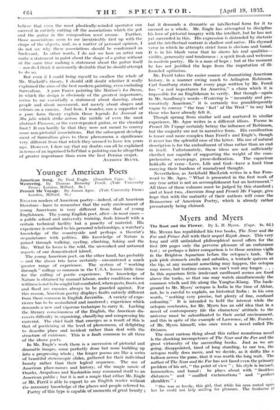Younger American Poets
ENGLISH readers of American poetry—indeed, of all American literature—have to remember that the early environment of young Americans is very different from that of young Englishmen. The young English poet, after—in most cases—
a school and university training, finds himself with a
certain technical facility but a paucity of material. His experience is confined to his personal relationships, a watcher's -knowledge of the countryside and perhaps a theorist's
acquaintance with politics. His knowledge of Nature is gained through walking, cycling, climbing, fishing and the like. What he loves is the wild, the unworked and untamed aspects of our domesticated island.
The young American poet, on the other hand, has probably —and the above trio have certainly—encountered a much 'greater range of experience: The system of " working through " college so common in the U.S.A.• leaves little time for the culling of poetic experience. The knowledge of Nature is obtained by manual labour, under conditions where wildness is not to be sought but combated, where pests, frosts, rot and flood arc enemies always to be guarded against. For this reason, American poetry displays faults entirely different from those common in English Juvenilia. A variety of expe- rience has to be assimilated and mastered ; experience which demands a new and vigorous teChnique to carry it. Lacking the literary consciousness of the English, the American dis- covers difficulty in organizing, classifying and compressing his material. The chief fault that emerges as a result of this is that of poeticizing at the level of phenomena, of delighting to describe place and incident rather than deal with the structure of existence. This is a .fault common to all three of the above poets.
In Mr. Engle's work there is a succession of pictorial and dramatic images, some perfectly done but none building up
into a progressing whole ; the longer poems are like a series of beautiful stereoscopic slides, gathered for their individual beauty rather than their logical sequence. The use of American place-names and history, of the magic music of Ozarks, Arapahoes and Kaskaskia may commend itself to an American public ; but it is not a magic that either Mr. Engle or Mr. Ferri! is able to export to an English reader without the necessary knowledge of the places and people referred to.
Poetry of this type is capable of moments of great beauty ;
but it demands a dramatic or intellectual form for it to succeed as a whole. Mr. Engle has attempted to discipline his love of pictorial imagery with the intellect, but he has not yet succeeded in this. His expression is distended by rhetoric and the intellectual content is shallow and naive. His rhymed verse in which he attempts strict form is obVious and banal. It is in his blank verse that he shows his real qualities— virility, generosity and tenderness : a spirit fresh and welcome in modern poetry. He is a man of hope ; but at the moment he has not justified the hope from the imputation of ill- founded optimism.
Mr. Ferril takes the easier course of dramatizing American history, in a manner owing much to Arlington Robinson. Carl Sandburg states that every page written by Mr. Ferri! has " a real importance for America," a claim which it is impossible for an Englishman to verify. But though—again in Mr. Sandburg's words—Westering is " incurably and pro- vocatively American," it is certainly too grandiloquently vague to convey " the true ' feel ' of the West " to any but those who have already felt it.
Though sprung from similar • soil and nurtured in similar experience, Mr. Agee writes in a different idioM. Poems in Permit Me Voyage certainly betray the influence of Robinson, but the majority are not in narrative form. His versification is terser and more complex than Ferril'S and Engle's, though it never has the splendid ease of the latter. His use of natural description is for the embodiment of ideas rather than an end in itself. Unfortunately, these ideas are not- sufficiently clarified nor capable of supporting the weight of the com-
prehensive, seven-page, prose-dedication. The capacious hold-ails of verse—Love, Life and God—have a hard time carrying their burdens of unanalysed thought.
Nevertheless, as Archibald MacLeish writes in a fine Fore- word to Mr. Agee, " What is presented hi the first work of any true artist is net an accomplishment but an instrument" All three of these volumes must be judged by this standard ; and at least two, American Song and Permit Me Voyage, give hope that with the maturity of their authors will come the Renascence of American Poetry, which is already rather prematurely being claimed.






































 Previous page
Previous page